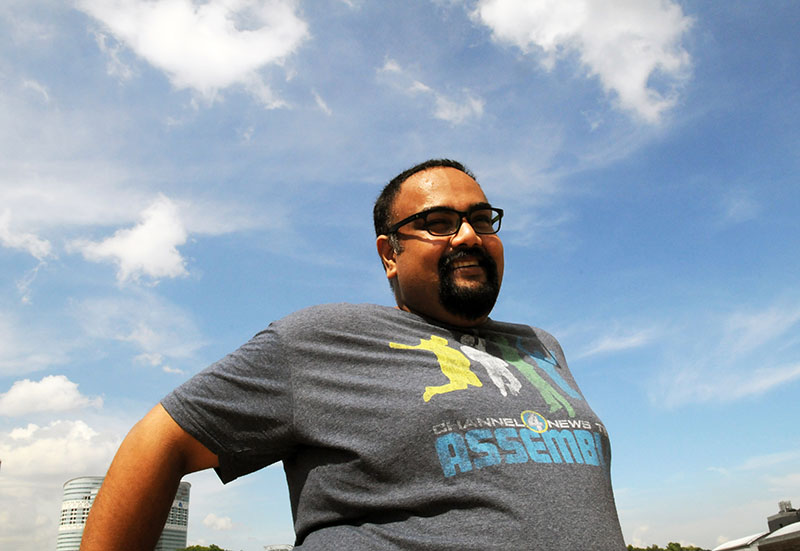Highlights
Meet a CQTian: Sai Vinjanampathy

Sai Vinjanampathy is a Research Fellow at CQT whose interests include quantum metrology and South Indian cooking
Who are you?
I'm Sai, I'm from Madras, now Chennai, in the state of Tamilnadu, India and I'm 32.
What kind of science do you do?
The only way I productively think is in pictures. This was borne out in my PhD about the role of geometry in quantum mechanics. Part of what I did was to investigate how to make technical statements about quantum processes, quantum technologies and so on, if you think in terms of pictures. This approach can help you get results and build intuition about things that are otherwise counterintuitive. The pictures allow you to think of possibilities, then at the end of the day you can check with equations.
Has thinking in pictures led you to new results?
One weird result was that I found (with my thesis advisor A.R.P.Rau), a connection between three areas of mathematics that was perhaps not previously known. I was very happy with this result. We connected Lie algebras, a branch of mathematics that has some relation to quantum computing, with two other branches, namely design theory and projective geometry.
Is that as esoteric as it sounds?
Yes and no. These different branches of mathematics have well-known applications individually. For example, the popular game Sudoku is an instance of combinatorial design, and projective geometry is related to the way that perspective is portrayed in paintings – it involves the study of geometry when one moves the 'vanishing point' of parallel lines from infinity to a nearer distance. In pointing out a connection between these three fields, we were making the case both for mathematical elegance and practical use. For instance, some of the tables generated from that work, I find useful in my everyday work. Such interplay between what is useful and what is beautiful is quite common to the physical sciences.
What are you applying your techniques to?
I work on quantum metrology and quantum control. Quantum control theory develops specific protocols to achieve specific 'quantum goals' in an 'efficient' manner. An example would be to excite an atom as quickly as possible, given some constraints. Quantum metrology is the field of quantum-assisted measurement science. Here the goal is to build better sensors from our understanding of quantum mechanics. These fields, it turns out, overlap.
How did you end up in Singapore?
It's just the usual thing, nothing romantic. I received my bachelors at the University of Madras, and my masters at the Indian Institute of Technology at Madras. I was in the US for almost 8 years after that – I did a PhD at Louisiana State University and then worked at the University of Massachusetts in Boston. I came to Singapore to attend the Quantum Discord Workshop 2012, and it was around the time I was looking for a job. There seemed to be opportunities here, and it made a lot of sense. The place academically, and otherwise, is wonderful – I've learnt a great deal and started wonderful collaborations with friends and colleagues – and of course the proximity to my home in India is another wonderful thing.
What do you enjoy about being in research?
I deeply enjoy thinking about possibilities. It's one of the most exciting things about this job. You get to sit and imagine in a very controlled way the possibilities of future technology. This is typically then followed by work to verify the possibilities. I also enjoy understanding old questions in physics from a new perspective. For instance, thermodynamics is a pillar of physics and engineering dating back to the time of steam trains. It has traditionally described the properties of classical physical systems with a very large number of constituent parts. Only in the past two decades have researchers satisfactorily answered questions about how to apply thermodynamics to small numbers of quantum systems, and it turns out the perspective of quantum information is crucial to addressing these questions.
And what's something you do when you are not thinking about physics?
Perhaps if I was not a physicist, I would have been a chef. I deeply enjoy cooking. I'd like to believe that I could run a South Indian kitchen like the one I grew up around at home. I enjoy cooking modern variants of rustic foods people were eating even 200 year ago. These rustic dishes involve lots of local tubers, root vegetables and leaves. This food is the staple of villages even today, though not common to Indian restaurant menus. There is kind of a movement throughout the world to locally-sourced, locally-farmed food, and I think entirely by serendipity I have grown up in a household that valued these ideals.






